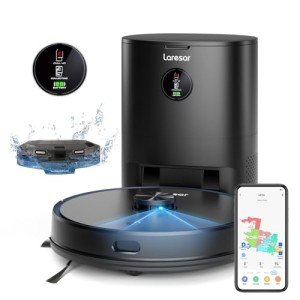Get Rid Of Robotic Vacuum: 10 Reasons That You No Longer Need It
The Rise of the Robotic Vacuum Cleaner: Revolutionizing Home Cleaning
In the world of household appliances, robotic vacuum have become among the most considerable developments recently. These autonomous devices provide convenience and effectiveness, permitting homeowners to preserve cleaner home without the drudgery of manual vacuuming. This post explores the evolution, functionality, advantages, and factors to consider concerning robotic vacuum cleaners, together with supplying insights through data tables and frequently asked concerns.
A Brief History of Robotic Vacuum Cleaners
The journey of robotic vacuum started in the late 20th century, with early prototypes stopping working to make substantial strides in homes. Nevertheless, robot hoover and mop UK in innovation caused the introduction of more refined models in the early 2000s. Business such as iRobot and Neato played a critical role in popularizing these smart home devices.
Advancement Timeline of Robotic Vacuum Cleaners
Year
Turning point
1996
Release of the first robotic vacuum, the ELECTROLUX TRINITY
2002
iRobot presents the Roomba, a commonly recognized model
2012
Intro of models with innovative mapping abilities
2020
Incorporation of expert system for enhanced navigation
2023
Models with integrated smart home connectivity and app control
How Robotic Vacuum Cleaners Work
Robotic vacuum cleaners utilize a combination of sensing units, mapping innovation, and artificial intelligence to browse and tidy various surfaces effectively. Here's a streamlined overview of their core performance:
Sensors: Equipped with infrared or ultrasonic sensors, these devices can detect challenges, cliffs, and dirt, allowing them to navigate through spaces without crashing into furniture or tumbling down stairs.
Navigation: Most modern-day robotic vacuum integrate clever mapping technologies, allowing them to map out the home design and optimize cleaning courses.
Cleaning Mechanism: Using brushes and suction power, robotic vacuums collect dirt, dust, and particles from numerous floor types, including carpets and wood.
Charging and Cleaning Schedules: After completing a cleaning session or when their battery runs low, these robots automatically return to their charging dock. Users can set cleaning schedules via mobile phone apps, assisting preserve a tidy home easily.
Advantages of Robotic Vacuum Cleaners
Robotic vacuum use many advantages over conventional vacuuming techniques. Here are some of the essential benefits:
- Time-Saving: Automated cleaning indicates house owners can designate their time to other activities.
- Convenience: Scheduling cleaning sessions permits a clean home without manual intervention.
- Thorough Cleaning: Many robotic designs include specialized brushes to deal with pet hair and offer deep cleaning on carpets and rugs.
- Smart Home Integration: Many systems work with wise home systems, using voice control and remote management.
Popular Features in Robotic Vacuum Cleaners
Feature
Description
Mapping Technology
Creates a digital map of the cleaning area
Mobile App Control
Provides users the ability to start/stop or schedule cleaning sessions remotely
Self-Cleaning
Some models have docking stations that can self-empty dust bins
Advanced Sensors
Finds dirt more successfully and browses better
Voice Control
Compatible with virtual assistants like Alexa and Google Assistant
Considerations Before Purchasing a Robotic Vacuum Cleaner
While robotic vacuum cleaners use many benefits, possible buyers must consider a couple of factors before purchasing. Here are some indicate keep in mind:
Key Factors to Evaluate
Floor Type: Certain designs carry out better on carpets while others stand out on hard floors. Buyers need to choose flexible vacuums if they have actually mixed flooring.
Battery Life: Longer battery life permits extended cleaning sessions. Search for designs that can cover large locations without frequent charging.
Dustbin Capacity: A larger dustbin minimizes the frequency of clearing, making cleaning less labor-intensive.
Noise Level: Some designs run quietly, which is perfect for homes with infants or delicate family pets.
Upkeep: Users must likewise examine the ease of maintenance, especially for filters and brushes.
Possible Drawbacks
- Price: Robotic vacuum cleaners can be significantly more expensive than conventional vacuums.
- Effectiveness: While they effectively preserve cleanliness, they may not constantly match the deep cleaning efficacy of manual vacuums.
- Challenge Navigation: Some models may have a hard time with certain kinds of furnishings or messy areas, possibly resulting in missed spots.
Frequently Asked Questions About Robotic Vacuum Cleaners
Q1: How typically should I run my robotic vacuum cleaner?
A1: It typically depends upon your family. For homes with animals or high foot traffic, running it day-to-day is advantageous. In less active homes, you might discover every other day suffices.
Q2: Can robotic vacuum work on carpets?
A2: Most robotic vacuums can clean up carpets; nevertheless, features such as suction power and brush design can substantially impact their effectiveness on different carpet types.
Q3: Are robotic vacuum cleaners helpful for animal hair?
A3: Yes, many designs are particularly created to get pet hair and come with specialized brushes to prevent tangling.
Q4: What takes place when the vacuum lacks battery?
A4: Most robotic vacuums instantly go back to their charging dock when their battery is low, ensuring they are prepared for the next cleaning session.
Q5: Can I manage my robotic vacuum with my mobile phone?
A5: Yes, numerous robotic vacuum cleaners come geared up with mobile apps that permit you to arrange cleansings, monitor development, and get alerts.
Robotic vacuum cleaners represent a considerable advancement in home-cleaning technology, combining benefit with effectiveness to fundamentally change how homes preserve cleanliness. As developments continue to emerge, these gadgets are becoming increasingly capable, using users not only time-saving solutions however also improved cleaning experiences. As the market continues to grow, prospective buyers are encouraged to weigh the features, advantages, and factors to consider thoroughly to discover the best model customized to their distinct needs. Whether it's a hectic family, a family pet fan, or someone seeking automation in their cleaning routine, there's most likely a robotic vacuum that fits the costs.
